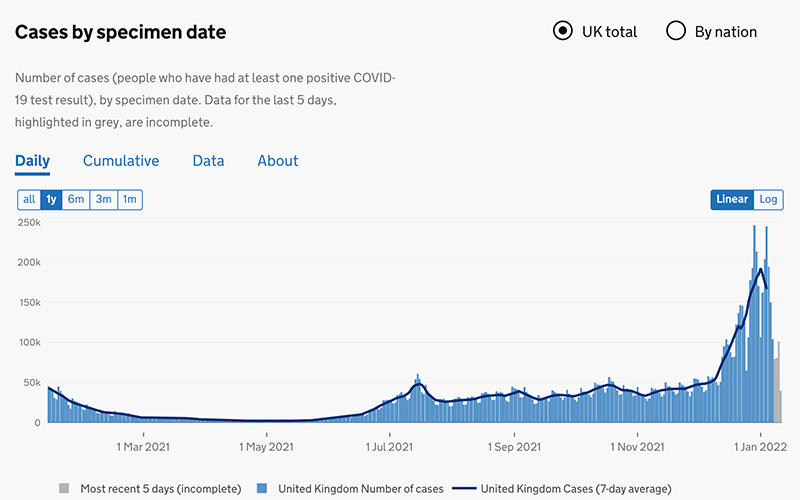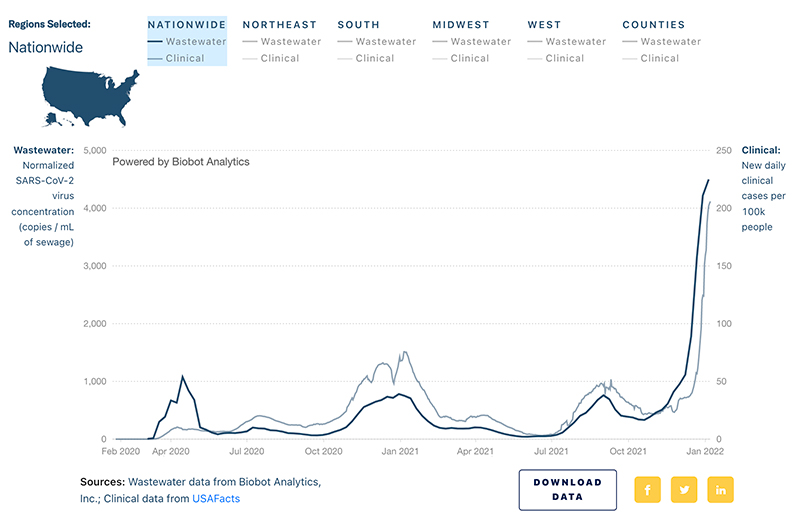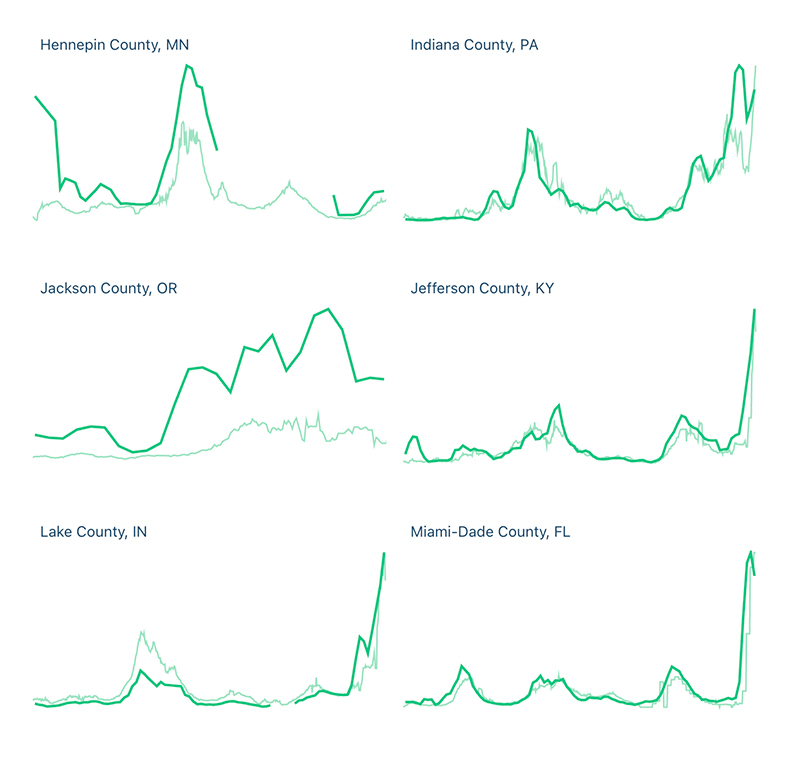Volcanoes are erupting in The Philippines, but on-fire Australia received some welcome rain. The Iran war cries have been called off and The Donald’s military powers are about to be hamstrung by the Senate. Meanwhile, his impeachment trial is starting, and we’re all on Twitter for a front-row seat.
What Could Go Right? Omicron starts its drop
The world’s first pig-to-human heart transplant, Pakistan’s supreme court nominates its first female judge, and more
This is our weekly newsletter, What Could Go Right? Sign up here to receive it in your inbox every Thursday at 6am ET. You can read past issues here.
A pig organ may one day save your life
In early fall 2021 we covered the first successful case of surgeons transplanting a pig kidney to a human. If you were a What Could Go Right? reader then, you may remember that the achievement, though significant, came along with several caveats. The kidney was attached outside the body to a brain-dead patient, and it was unclear whether the kidney would function for long. Still, it opened the possibilities, for the first time realistically, of using animal organs to ameliorate long organ transplant waitlists.
Less than four months later, we now have the first-ever pig-to-human heart transplant, which was done inside the body of a live patient. The American man who underwent the surgery is so far faring well, breathing on his own.
As Rev. Tadeusz Pacholczyk, director of education at the National Catholic Bioethics Center in Philadelphia, told USA Today, “I suspect this is a first step on the journey from yesterday’s ‘scientifically unimaginable’ to today’s ‘barely achievable’ to tomorrow’s ‘standard of care.’” (And thanks to reader Alaina for being the first to spot and send this story to us!)
Graphs galore: Omicron hits apex
At the top of the newsletter last week we called it that Omicron cases in England were likely to drop soon. This week we have the Associated Press (AP) to back us up: “Scientists are seeing signals that Covid-19’s alarming Omicron wave may have peaked in Britain and is about to do the same in the United States, at which point cases may start dropping off dramatically.”
Here’s the start of that visually satisfying descent. The data is from the United Kingdom’s National Health Service (NHS):

Covid modelers quoted in the AP article estimate that the US’ peak may have already come and gone, on January 6, or is about to, on January 19. National data collected by the Centers for Disease Control and Prevention (CDC) is notoriously gappy, so it’s still best to keep an eye on your local numbers.
On Twitter this week, there was much to-do over this graph of wastewater tracking data, which shows cases in the Boston area already coming down. If you’re going by wastewater measurement—which is done by detecting genetic traces of Covid in, you guessed it, excrement, and which has the benefit of not being limited by testing shortages—it looks like the crest of the US’ mountain is starting to form.

By county, the data is mixed. A small sample:

Data from Biobot Analytics. Their methodology is here, if any data nerds are wondering.
While hospitalization and death peaks usually lag by a few weeks, perhaps these graphs can serve as your light at the end of the Omicron tunnel. This is not meant to encourage giving up on Covid-safe behaviors but the opposite: to buoy you with the energy to practice them for just a bit longer, while we move through this major wave.
By the way, if you’re curious to compare this wave against previous ones, numbers to numbers, Our World in Data has asked and answered the question “how are confirmed cases translating into hospitalizations, ICU admissions, and deaths now that many have been vaccinated?” with four graphs from the UK, Germany, Spain, and Israel.
Equitable vaccination and cracking the case of long Covid
Remember when the world was hit with a deadly pandemic, a handful of pharmaceutical companies developed life-saving vaccines with miraculous speed, and then hoarded the recipe and prioritized rich countries’ purchases so much that poorer countries could neither buy doses nor develop their own version? Mhm, we do, too. A vaccine developed by a team in Texas is attempting to change the playing field with CORBEVAX, which India authorized for emergency use in December and is now producing. It’s not an mRNA vaccine, and thus cannot adapt to variants as quickly, but it tops out at $1.50 per dose, and countries are allowed to manufacture it on their own. For comparison, a dose of the Pfizer-BioNTech vaccine costs around $20, although it depends on who is buying. That price will only increase, long-term, so it’s critical to have cheaper options.
We may be getting somewhere in figuring out what causes long Covid. A South African scientist found that long Covid sufferers carry persistent “microclots” that they are unable to break down, starving the body’s tissues of oxygen.
We’re also getting closer to conquering the scientific hill of a universal flu vaccine. Scientists have discovered a new jumping off point in people’s blood: antibodies that “can attach to a part of the virus that doesn’t mutate as much as what traditional flu vaccines aim at.” These antibodies can recognize and fend off different types of flu.
Before we go
Last month we reported that Capital One was ending overdraft fees and hoped they were first in a long line of copycats. Bank of America has (almost) followed suit, reducing overdraft fees from $35 to $10, starting in May. They are also ending non-sufficient funds fees in February. Who is next?
Last summer we introduced our readers to Magawa, a rat who spent an illustrious career clearing hidden explosives in Cambodia, where landmines left over from decades of war still accidentally detonate, killing and maiming people. Magawa, a prodigious mine-sniffer, died naturally and peacefully over the weekend after an eight-month rest in retirement.
For the first time in its 74-year history, Pakistan’s supreme court has nominated a female judge to its ranks. The Guardian lists outlawing virginity tests for rape survivors, which now applies in the Pakistani state of Punjab, as one of Justice Ayesha Malik’s landmark verdicts.
Below in the links section, a giant battery recycling plant is coming to the US, honeybees are finding refuge on Paris rooftops, seed-dropping drones are planting trees, and more.
Bonus Podcast Episode: The World-Turning Power of Ideas

We ignore or underestimate the power of ideas to our detriment. And yet they can feel slippery to reckon with; difficult to see, tougher still to understand their complex movement through the world. How can we harness their influence for good? Join The Progress Network for a wide-ranging discussion on ideas with Joan Blades, co-founder of Living Room Conversations and MoveOn.org, and public intellectual Steven Pinker, author of Enlightenment Now and several other books. The conversation was originally recorded on May 12, 2021. | Listen to the episode
Read an excerpt:
Steven Pinker: There is a zone in life in which we are completely rational, and that’s how we transformed the planet and had technology and science and medicine and all the rest. The thing is that there are other zones where the whole Enlightenment and scientific revolution hasn’t really sunk in. When it comes to things like deep history, metaphysics, what happens in remote corridors of power and how the microscopic processes work—if we don’t see them with our own eyes, if they don’t affect our day-to-day life, they’re in a zone more of mythology than factual reality, where beliefs are evaluated in terms of how uplifting they are, how energizing they are to your coalition, how much they glorify or demonize the other side.
Until the scientific revolution, we had no way of knowing what happened 10,000 years ago. How atoms work, how bacteria work—no one could find out. And so it didn’t matter, really, what you thought in terms of how you lived your life. But you could have theories that you shared within your tribe that could make your tribe look good, that could embolden them to stand up to its enemies. And I think a lot of that psychology is still with us. So what we have to do is look at the border between the zones in which people are driven by uplifting myths as opposed to empirical facts, and try to push the boundaries, so that more and more of what people already treat rationally is encompassed by that mindset. With highly politicized issues, it is true that people can be completely mule-headed. They can simply ratify what makes their own political party, their own religion look good. But there is a flexibility—when people see a graph, they will often change their mind. When they’re told, “Get into a skeptical mindset, do you think this is really true or not?” they can exercise that kind of skepticism, and it can extend to other beliefs. It doesn’t happen enough, but the capability does exist.
Joan Blades: I’m not suggesting for a minute that it doesn’t exist. But facts don’t convince people until you have a connection. If someone I distrust tells me something, it totally passes me by. Persuasion, perversely enough, is much less effective at changing people’s views than really listening and asking some good questions, and developing that connection where you have an exchange where trust and a relationship are built. That’s my quintessential example of the need for having that relationship to be able to make progress, to be an effective actor.
I’m focused on the US political situation. If everybody in DC woke up tomorrow morning with whatever your top issue is—for me, climate change is way out in front—as their top priority, I do not think it would mean that our leadership would be particularly effective. I look at healthcare, where we’ve had affordable high-quality healthcare as a priority for decades. And we’ve got the most expensive healthcare in the world, and it’s not even in the top ten in terms of outcomes. So it’s that combination of creating good human dynamics that allows the facts to then be incredibly effective. But we tend to want to skip that human part and go right to the facts, and then we don’t get anywhere. . . . | Finish the conversation
Progress, Please
(Found good news? Tweet at us @progressntwrk or email.)
Other good stuff in the news
United States:
- Poet Maya Angelou became the first black woman on the US quarter | BBC
- The largest battery recycling plant in North America is about to open | Fast Company
- A new Illinois law allows women to obtain contraception from pharmacists without seeing a doctor first | Chicago Magazine
- Home Covid tests will be covered by insurers starting Saturday | AP
- Rachel Balkovec will become the first female manager in Minor League Baseball | BBC
- Youth-led affordable housing is offering a transition to independence in Minneapolis | Next City
- Why your local library might be hiring a social worker | NPR
- A possible cervical cancer screening tool? A menstrual pad | The Washington Post
International:
- The history of the end of poverty has just begun | Our World in Data
- A project in Spain aims to restore abandoned water channels to help rural communities and support sustainable agriculture | El País
- Germany appointed its first “commissioner for queer affairs” | DW
- mRNA vaccine technology has helped repair broken hearts in mice | New Scientist
- Paris is leading a push to install honeybee colonies on city rooftops | Bloomberg
- Urban ecology that saved the Argentine city of Rosario is being held up as a model for other cities | Mongabay
- Study: A blood test could help detect cancer in people with nonspecific symptoms | The Guardian
- An Australian start-up aims to tackle deforestation with seed-dropping drones | Euronews
- Researchers may have found a way to revitalize batteries by bringing “dead” lithium back to life | TechXplore
- Canada’s law banning “conversion therapy” went into effect | The New York Times
TPN Member originals ![]()
- Why Democrats are so bad at defending democracy | David Brooks
- A parenting movement emerges from the pandemic | Alissa Quart
- A cornerstone of sustained prosperity is the “unlock”: unleashing a leap forward with a new approach | Scott Galloway
- Britain needs immigrants if it is to survive the climate storm | Parag Khanna
- Fiona Hill on the working class, populism, and Russia | Yascha Mounk
- How to overcome guilt, fear, and low self-esteem | Arthur Brooks
- Crypto cannot easily be painted green | Gillian Tett
- Green upheaval: The new geopolitics of energy | Jason Bordoff and Meghan L. O’Sullivan
Traverse the world’s recent advancements with our long list of the week’s progress links.
Upcoming Events
- The Good, the Bad, and the Surprising: How Pandemics Change Us | Nicholas Christakis | January 19
- Social Media on Campus: Advantageous, Addictive, or All of the Above? | Manu Meel | January 27
Until Next Time
We wish you healthy (and regular) “scientific contributions.”



 !
!